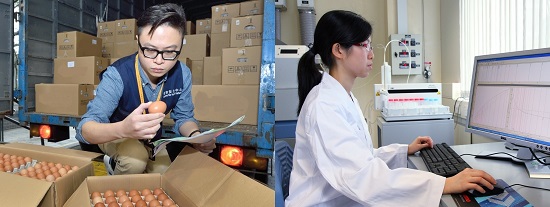
Food Safety Focus (134th Issue, September 2017) – Incident in Focus
Pesticide Fipronil Detected in Eggs
Reported by Dr. Violette LIN, Scientific Officer, Risk Communication Section and
Dr. Cherrie NG, Veterinary Officer, Risk Assessment Section
Centre for Food Safety
The Incident
On 2 August 2017, the Netherlands Food and Consumer Product Safety Authority (NFCPSA) issued a notice that certain eggs produced in the Netherlands were detected as containing fipronil, a pesticide, at levels which might cause adverse health effects to consumers. Subsequently, other authorities such as those in South Korea and Taiwan also reported fipronil detected in their locally produced eggs.
The incident in the European Union (EU) was reported to be caused by illegal use of the chemical on egg farms to combat parasites in chickens. This illegal activity has resulted in fipronil being detected in eggs and chicken meat (meat from laying hens to be replaced).
This article discusses the use of fipronil and its potential health effects to humans, the local regulatory control of fipronil in eggs, and the actions taken by the Centre for Food Safety (CFS) on this incident in protecting public health.
Fipronil and Its Adverse Health Effects to Humans
Fipronil is a broad-spectrum insecticide and acaricide. It can control leaf-feeding pests, soil pests and borers in crops and combat external parasites in companion animals, such as dogs and cats. However, fipronil is not allowed to be used on food producing animals in the EU where this incident arose.
Fipronil, if consumed in large quantities, may damage the kidneys, liver and thyroid gland. According to current scientific knowledge, fipronil is not classified as mutagenic or carcinogenic, and has no known harmful effects on reproduction or unborn.
Local Regulatory Control of Fipronil in Eggs
In Hong Kong, fipronil in eggs is regulated under the Pesticide Residues in Food Regulation (Cap. 132CM). The maximum residue level of fipronil in eggs is 0.02ppm, a level which is consistent with the corresponding standard specified by the Codex Alimentarius Commission. Under the CFS Food Surveillance Programme, egg samples are collected at import, wholesale and retail levels for chemical and microbiological testings to ensure that they meet legal requirements and are fit for human consumption (Figure 1).

Figure 1: Samples of imported eggs are inspected and tested for chemicals including fipronil.
Good Farming Practices with regard to Use of Chemicals
For foods of animal origin, food safety starts at the farm level, where the food is produced. The Guide to Good Farming Practices issued by the World Organisation for Animal Health and the Food and Agriculture Organization of the United Nations provides recommendations in this regard. The Guide recommends that farmers or managers should be aware of and comply with restrictions in the local regulations on usage of chemicals such as veterinary medicines and biologicals in livestock and the farm environment. These substances should be used judiciously and according to the manufacturer’s instructions or veterinary prescription for veterinary medicine. Records of use of these chemicals should be kept.
In Hong Kong, keeping of poultry for producing meat or eggs for human consumption requires a licence and is regulated under the Public Health (Animals and Birds) (Licensing of Livestock Keeping) Regulation (Cap. 139L) enforced by the Agriculture, Fisheries and Conservation Department. Various aspects of farm management and control are specified in the licensing conditions.
Actions Taken
From 2014 to July 2017, the CFS has collected a total of about 1290 poultry egg samples for chemical (including fipronil) testing and results were satisfactory. Nevertheless, upon receiving the notice from NFCPSA, among others, the CFS held and tested eggs imported from the EU member states including the Netherlands and Belgium where use of fipronil had been reported. As of 31 August 2017, out of 76 samples of eggs and egg products from EU members states collected for fipronil testing, eight were found exceeding the local legal limit. However, based on the levels of the pesticide detected in the egg samples tested by the CFS, adverse health effect is not expected under usual consumption.
In response to the incident, the CFS has stepped up holding and testing of poultry eggs from EU member states at import level and enhanced surveillance on eggs. The CFS has maintained liaison with the relevant overseas authorities including authorities in the European Commission and will continue to take appropriate follow-up action. Information on the updates of the incident is available in the CFS Facebook and CFS webpage .
Key Points to Note:
- Fipronil, a broad-spectrum insecticide and acaricide used to control pests, is not recommended to be used on food producing animals.
- At import level, the CFS has stepped up control measures on eggs and egg products.
- Fipronil in foods is regulated under Cap. 132CM.
Advice to the Trade
- Ensure food sold is fit for human consumption.
- Adhere strictly to the local regulations, including Cap. 132CM.
- Obtain eggs and egg products from reliable sources.
Advice to the Public
- Take a balanced diet so as to avoid excessive intake of food chemicals from a small range of food items.
- Follow the CFS website and Facebook for the developments of the incident.

